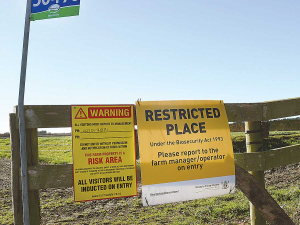MPI Hails Kiwifruit Boom as Horticulture Revenue Surges Past $9 Billion
Ministry for Primary Industries (MPI) Director General Ray Smith is giving a big shout-out to the horticulture sector, especially kiwifruit.
 MPI says imported semen is one of the possible pathways for the bacterial disease M bovis' entry into New Zealand.
MPI says imported semen is one of the possible pathways for the bacterial disease M bovis' entry into New Zealand.
The Ministry for Primary Industries says imported semen remains one of the possible pathways for the bacterial disease Mycoplasma bovis' entry into New Zealand.
Simon Andrew, director M. bovis Programme, says they are still investigating likely transmission routes.
"We've not identified any live M. bovis in testing of imported semen to date, but it is one of the possible pathways," he told Rural News.
At a recent primary production select committee hearing MPI director-general Ray Smith noted that the new incursion on a mid-Canterbury farm earlier this year was worrying. He said it was picked up through bulk tank milk testing.
"It most likely would have come through semen," Smith told the committee.
This prompted ACT's Primary Industries Spokesperson Mark Cameron to claim, "After much speculation, this is the first time that the MPI has openly admitted that imported semen is the likely culprit for the most recent incursion of M. bovis".
Cameron told Rural News that if imported semen was such a risk, the question is why it took until July 2022 for proper Import health standards to be in place.
"The initial outbreak occurred back in 2017 and had a huge impact on the industry. It caused enormous stress and anxiety for farming families and the financial and emotional toll on farmers cannot be underestimated.
"If there was a risk of imported semen bringing another strain to New Zealand then standards needed to be in place much sooner," he says.
"Farmers can't afford another outbreak.
"ACT hopes that the current cases in mid-Canterbury are contained as MPI have said they are and that all the stops are being pulled out to ensure there isn't another incursion.
Simon Andrew told Rural News that the import health standard for bovine germplasm was strengthened to further reduce the likelihood of viable M. bovis in imported bovine germplasm.
The current import health standard for bovine germplasm came into force on August 25 last year with a transition period to 25 April this year.
"New Zealand's standards for the import of bovine germplasm are among the strongest in the world," Andrew says.
New Zealand and Chile have signed a new arrangement designed to boost agricultural cooperation and drive sector success.
New DairyNZ research will help farmers mitigate the impacts of heat stress on herds in high-risk regions of the country.
Budou are being picked now in Bridge Pā, the most intense and exciting time of the year for the Greencollar team – and the harvest of the finest eating grapes is weeks earlier than expected.
The Real Estate Institute of New Zealand (REINZ) has released its latest rural property report, providing a detailed view of New Zealand’s rural real estate market for the 12 months ending December 2025.
Rural retailer Farmlands has released it's latest round of half-year results, labeling it as evidence that its five-year strategy is delivering on financial performance and better value for members.
OPINION: "We are back to where we were a year ago," according to a leading banking analyst in the UK, referring to US president Donald Trump's latest imposition of a global 10% tariff on all exports into the US.

OPINION: A mate of yours truly reckons rural Manawatu families are the latest to suffer under what he calls the…
OPINION: If old Winston Peters thinks building trade relations with new nations, such as India, isn't a necessary investment in…